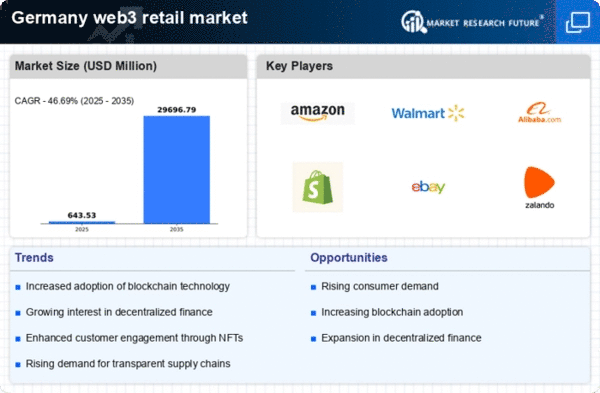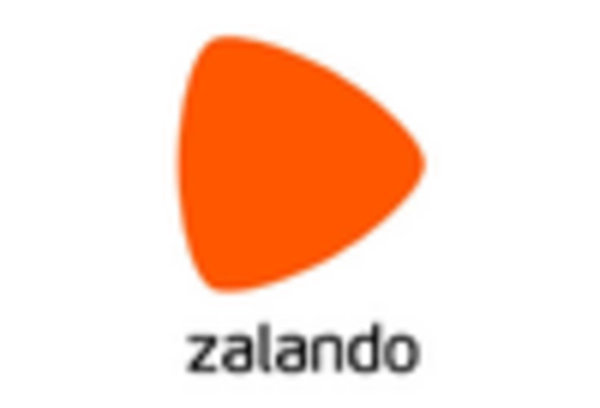Adoption of Blockchain Technology
The adoption of blockchain technology is a pivotal driver in the web3 in-retail market. In Germany, retailers are increasingly leveraging blockchain to enhance transparency and traceability in supply chains. This technology allows for real-time tracking of products, which can significantly reduce fraud and improve consumer trust. According to recent data, approximately 30% of German retailers are expected to implement blockchain solutions by 2026. This shift not only streamlines operations but also aligns with consumer demand for ethical sourcing and sustainability. As the web3 in-retail market evolves, the integration of blockchain could redefine traditional retail practices, fostering a more secure and efficient shopping experience.
Consumer Demand for Personalization
Consumer demand for personalization is reshaping the web3 in-retail market in Germany. Shoppers increasingly expect tailored experiences that cater to their individual preferences. This trend is supported by data indicating that 70% of consumers are more likely to purchase from brands that offer personalized recommendations. Retailers are utilizing web3 technologies, such as AI and machine learning, to analyze consumer behavior and deliver customized content. This not only enhances customer satisfaction but also drives sales growth. As personalization becomes a standard expectation, retailers who fail to adapt may find themselves at a competitive disadvantage in the evolving web3 in-retail market.
Enhanced Security and Data Protection
Enhanced security and data protection are critical drivers in the web3 in-retail market. With rising concerns over data breaches and privacy violations, German consumers are increasingly seeking assurance that their personal information is secure. The implementation of decentralized systems in the web3 framework offers a potential solution, as it allows for greater control over personal data. Approximately 40% of consumers express a preference for retailers that utilize blockchain for data protection. This trend indicates a shift towards more secure shopping environments, where consumers feel confident in their transactions. As the web3 in-retail market evolves, prioritizing security will likely be essential for building consumer trust.
Rise of Digital Wallets and Cryptocurrencies
the rise of digital wallets and cryptocurrencies is significantly influencing the web3 retail market in Germany.. With the increasing acceptance of cryptocurrencies as a payment method, retailers are exploring ways to integrate these options into their platforms. Data suggests that around 15% of German consumers have used cryptocurrencies for online purchases, a figure that is likely to grow as more retailers adopt this payment method. Digital wallets not only facilitate seamless transactions but also enhance security and reduce transaction fees. As the web3 in-retail market continues to expand, the integration of these payment solutions could reshape consumer purchasing behavior.
Focus on Sustainability and Ethical Practices
A growing focus on sustainability and ethical practices is emerging as a key driver in the web3 in-retail market. German consumers are increasingly prioritizing brands that demonstrate a commitment to environmental responsibility. Research indicates that 60% of consumers are willing to pay more for sustainable products. Retailers are responding by adopting web3 technologies to promote transparency in sourcing and production processes. This shift not only meets consumer expectations but also aligns with regulatory pressures for sustainable practices. As the web3 in-retail market matures, the emphasis on sustainability may become a defining characteristic of successful retail strategies.
















